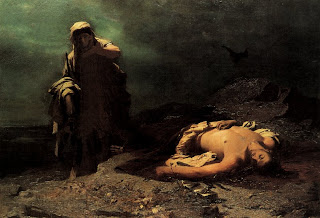ambit [ˈæmbɪt] n.
1.) A circuit, compass, or circumference, esp. a space surrounding a house, castle, town, etc.; the precincts, liberties, ‘verge.’
2.) The confines, bounds, limits of a district.
3.) fig. Extent, compass, sphere, of actions, words, thoughts, etc.
Etymology: adaptation of Latin ambit-us a going round, a compass; from amb- about + -itus going, from ī-re to go.
"—Stephen: Yeah, and surprisingly, there's a very, very narrow ambit of temperature within which sperm can live, so if it's too hot, they need to dangle down and get a lot of air through them to cool them down, and if it's very cold they need to— [sucks inward and brings his hands tightly together].
—Alan: Once they're out, they're alive for eighteen hours, so you should leave the telly on if you're going out or something" (QI, John Lloyd (creator), 2006).
(A Fishing Boat Brought Ashore Near Conway Castle, Philip Jacques de Loutherbourg, 1800)
____________________________________________________
Hi all! Apologies for the long dearth of high diction, but I had to go back to London to defend my master's thesis. It was successful though so, barring a few administrative formalities, I'm now a Master of Philosophical Studies. And I will be insisting that you refer to me as "Master E" from now on. Anyway, good to be back in the blogosphere; I'll have to catch up on what you all have been up to. Thanks for reading!
cortege [kɔrˈtɛʒ] n.
1.) A train of attendants, as of a distinguished person; a retinue.
2.) A ceremonial procession.
3.) A funeral procession.
Etymology: French cortège, from Old Italian corteggio, from corteggiare, to pay honor, from corte, court, from Latin cohors, cohort-, throng.
"Thebes, city of death, one long cortege
and the suffering rises
wails for mercy rise
and the wild hymn for the Healer blazes out
clashing with our sobs our cries of mourning—
O golden daughter of god, send rescue
radiant as the kindness in your eyes!"
(Oedipus the King by Sophocles, Robert Fagles (trans.), 1977)
(Cortege, Leonor Fini, 1960)
____________________________________________________
Anyone want to be in my cortege?
nonce-word [nɒns] n.
1.) A word invented "for the nonce," that is, for one occasion only. There are related terms such as nonce-borrowing (=a word borrowed from a foreign language only for one occasion), nonce-compound, nonce-expression, and nonce-meaning (Garner's Modern American Usage 3rd Edition).
Etymology: The first editor of the Oxford English Dictionary, James A. H. Murray (1837-1915), invented this expression for use in the Dictionary's entries.
"What's with voguism? The reader will ask: 'Is it a word? Why isn't it in my dictionary?' It is not synonymous with nonce-word, which is 'a term used once for some special occasion.' Rather, voguism is a not-so-new neologism that was created in this space in 1982. Though picked up and used once by Newsweek, the word has since languished, out of print and out of sorts" (The Right Word in the Right Place at the Right Time: Wit and Wisdom from the Popular "On Language" Column in The New York Times Magazine, William Safire (ed.), 2004).
(The Elephant Celebes, Max Ernst, 1921)
break Priscian's head [ˈprɪʃiən] v. phr.
1.) To violate the rules of grammar (Garner's Modern American Usage 3rd Edition).
Etymology: In the 6th century, Priscian wrote an 18-volume Latin grammar that was copied by almost every library in Europe and influenced writers for several centuries. He is reputed to have been so devoted to the study of grammar that making an error in his presence hurt him as much as a blow to the head.
"Quakers, that like to lanthorns, bear
Their light within them, will not swear;
Their gospel is an accidence,
By which they construe conscience,
And hold no sin so deeply red,
As that of breaking Priscian's head."
(Hudibras, Samuel Butler, 1684)
(The Cornell Farm, Edward Hicks, 1848)
________________________________________________
Today's phrase in honor of Lemons Don't Make Lemonade, the winner (again) of the weekly contest. She wrote: Even though the Roman Catholic church is one of the biggest religious institutions in the world, few true votaries remain within its inner circles. Devotion to the Word of God is no longer a prerequisite for modern day cardinals, who usually possess the legerdemain to amass financial wealth and the savoir-faire to charm their way to the Pope's throne. To quash the chances of their opponents, cardinals running for the papacy often resort to bribery. And since the cliche "money talks" often proves to be accurate, a dirty cardinal's chances are often not bad at all.
Nicely done again, Lemons. You used litotes rather than the word "litotes", but that's okay. That was back before the days of the Sunday rhetoric feature, so it was unclear what you were supposed to do. Also, this is your 5th victory, so you're the 1st winner of a prize! Congrats! Which book do you want? (I wonder how much shipping to Singapore is going to cost.) Well, let's take another week off since I haven't been blogging regularly again; hopefully I'll get back into it this week. Thanks for reading!
perquisite [ˈpɜrkwəzɪt] n.
1.) A payment or profit received in addition to a regular wage or salary, especially a benefit expected as one's due.
2.) A tip; a gratuity.
3.) Something claimed as an exclusive right (American Heritage Dictionary of the English Language).
Etymology: From Middle English perquisites, property acquired otherwise than by inheritance, from Medieval Latin perquisitum, acquisition, from Latin, neuter past participle of perquirere, to search diligently for: per- + quaerere, to seek.
"Give me glory! What greater glory could I win
than to give my own brother a decent burial?
These citizens here would all agree,
if their lips weren't locked in fear.
Lucky tyrants—the perquisites of power!
Ruthless power to do and say whatever pleases them" (Antigone by Sophocles, Robert Fagles (trans.), 1982).
(Η Αντιγόνη εμπρός στο νεκρό Πολυνείκη, Νικηφόρος Λύτρας, 1865)





